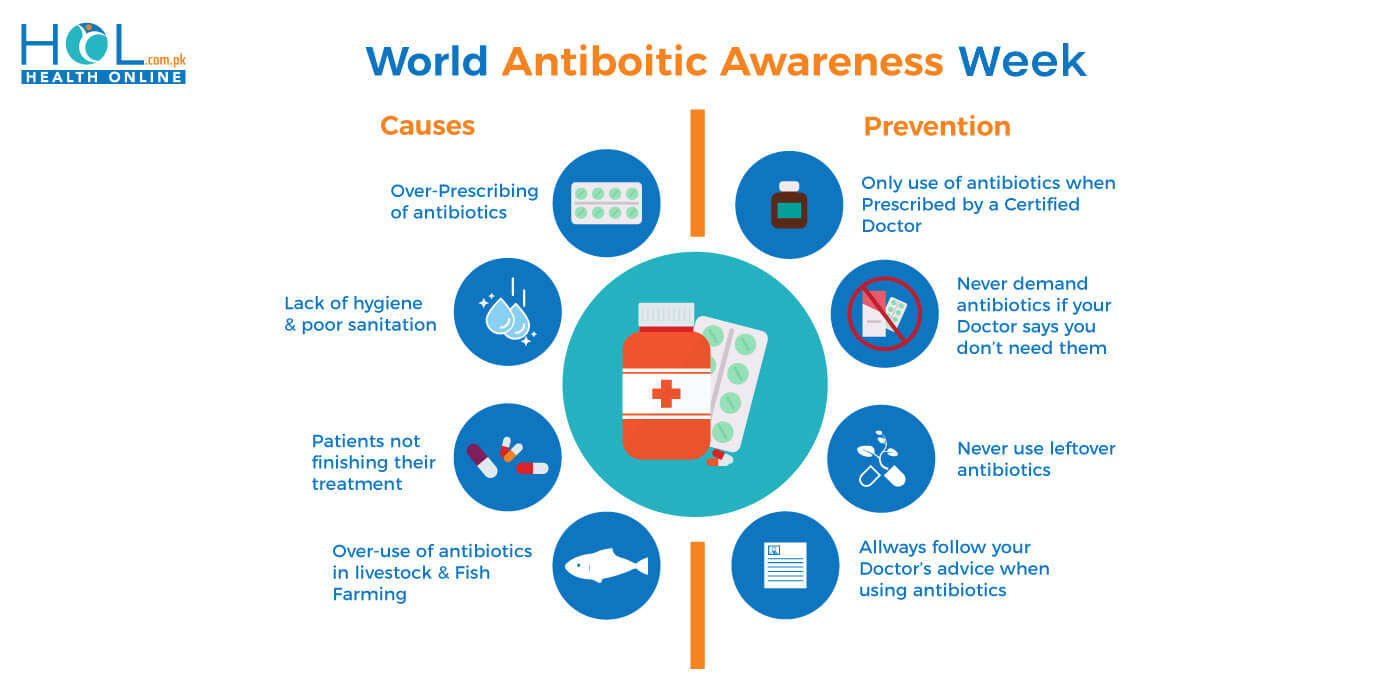World Antibiotics awareness week dates started from 18-24 of November every year have been decided by The Tripartite Executive Committee by the slogan of ANTIMICROBIALS and it is applicable to all sectors. Its aim is to increase the awareness of antimicrobial resistance and encourage the best policies to be implemented by healthcare professionals. So by keeping the important point of resistance we have broadened the campaign from antibiotic to antimicrobials.
Antibiotics are active against bacteria to fight against bacterial infections, widely used in treatment and prevention of infections. They may either stops the growth of bacteria, known as Bacteriostatic. Or kill the bacteria, known as Bactericidal.
Narrow–spectrum antibiotics target a few types of bacteria and have chances to develop resistance against bacteria while broad–spectrum antibiotics target many types of bacteria and comparatively they do not develop antibiotic resistance. Various types of antibiotics include penicillin , cephalosporins, tetracyclines, aminoglycosides, macrolides and quinolones etc.
Some common side effects of antibiotics may include rashes, allergic reactions, nausea, diarrhea, and stomach pain.
It is important to take antibiotics correctly. If you do not, this may reduce their efficacy. For example, some antibiotics need to be taken with food and some should be taken on an empty stomach. If you do not use your antibiotics properly it will affect your body adversely especially in children and elderly patients. Therefore, follow the instructions given to you by your doctor and pharmacist. Always take the entire course of antibiotics as directed by your doctor. If the antibiotic is stopped in the middle of the course, the bacteria may become resistant to that antibiotic.
Overuse of antibiotics
The overuse of antibiotics especially taking antibiotics even when they’re not the appropriate treatment promotes antibiotic resistance. According to the Centers for Disease Control and Prevention, one-third to one-half of antibiotic use in humans is unnecessary.
Taking antibiotics responsibly
It’s tempting to stop taking an antibiotic as soon as you feel better. But the full treatment is necessary to finish the disease-causing bacteria. Failure to take an antibiotic as prescribed can result in the need to resume treatment later and may promote the spread of antibiotic-resistant properties among harmful bacteria.
Consequences of antibiotic resistance
Consequences of medication-resistant infections include:
- More-serious illness
- Longer recovery
- More-frequent or longer hospitalization
- More doctor visits
- More-expensive treatments
Antibiotic stewardship
The appropriate use of antibiotics called antibiotic stewardship can help to:
- Conserve the usefulness of current antibiotics
- Increase the life span of current antibiotics
- Protect from antibiotic-resistant infections
- Avoid side effects of using unsuitable antibiotics
Many hospitals and medical associations have implemented new diagnostic and treatment guidelines to ensure effective treatments for bacterial infections and reduce misuse of antibiotics.
The public also plays a role in antibiotic stewardship. You can help reduce the development of antibiotic resistance if you:
- Avoid pressuring your doctor to give you an antibiotic prescription. Instead ask him for advice on how to treat symptoms.
- Practice good hygiene.
- Make sure that you do not miss recommended vaccinations. Some recommended vaccines protect against bacterial infections, such as diphtheria and whooping cough
- Don’t drink raw milk, wash your hands, and cook food properly to prevent bacterial infection.
- Use antibiotics only as prescribed. Follow the prescribed daily dosage, and complete the entire course of treatment.
- Never take leftover antibiotics for a later illness.
- Never take antibiotics prescribed for another person.


